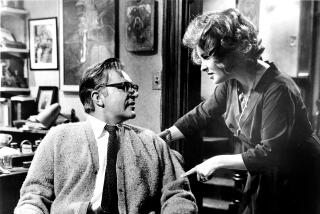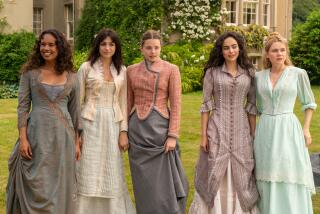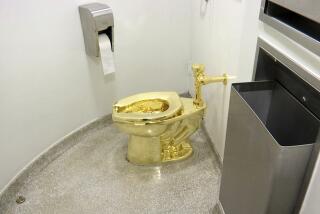Book review: ‘The Churchills: In Love and War’ by Mary S. Lovell
The Churchills
In Love and War
Mary S. Lovell
W.W. Norton: 640 pp., $35
Intelligent and well-written, like all of Mary S. Lovell’s biographies, “The Churchills” provides a vivid introduction to the family of English aristocrats whose nation-preserving achievements stretch from the Battle of Blenheim to the Battle of Britain and beyond. The Churchills are a much-chronicled clan, and although footnotes indicate that Lovell has read all the relevant books and delved into vast archives of personal papers, there’s nothing startlingly new here. Instead, as she did in “The Mitford Girls,” the author synthesizes a variety of familiar material to create a lively collective portrait.
A brief opening chapter spotlights John Churchill, whose military genius elevated him from minor gentry to first Duke of Marlborough. His sensational victory against the French at Blenheim in 1704 brought him a royal land grant and a hefty sum from Parliament to build a palace in Oxfordshire named after his most famous battle. Chapter 2 whisks in nine pages across nearly two centuries, during which “six generations successfully established themselves in Britain’s ruling elite,” to alight in 1873, when Lovell’s main narrative begins with the whirlwind romance of Randolph Churchill, younger son of the seventh duke, and the American heiress Jennie Jerome.
Their volatile marriage quickly produced Winston Churchill, the titanic center of an extended family drama that Lovell follows through every juicy scandal and political maneuver over the next 90 years. Winston’s mother was not the only “Dollar Princess” whose fortune improved the aristocratic Churchills’ straitened finances. Lovell also tells the sad story of Consuelo Vanderbilt, forced by her social-climber mother into a loveless match with Winston’s cousin Sunny, the ninth Duke of Marlborough, who used her millions to modernize and restore Blenheim Palace, fallen into disrepair after being looted of its art treasures by his improvident ancestors.
Winston, who helped arrange the settlement that ended this miserable union, could hardly have been shocked by the revelation of Sunny’s and Consuelo’s infidelities. His own mother had numerous lovers (though Lovell doubts the 20th century estimate of 200), yet Jennie remained publicly loyal to Randolph as he recklessly destroyed a promising political career, and she nursed him through the final stages of syphilis until his death in 1895.
This turbulent family history left Winston with a tolerant attitude toward other people’s peccadilloes and a driving ambition to redeem his father’s political failure. It was probably just as well that his parents’ lavish lifestyle meant he had to make his own way financially. Though family connections helped him win his first election to Parliament in 1900, he had already acquired the toughness and resiliency that would enable him to survive many shifts in political fortune.
Lovell, who freely admits that Winston “was a hero to me as a child,” depicts his elevation to prime minister in 1940 at age 65 as the just reward for a lifetime of independence and tough-minded realism. He had inner resources his kin largely lacked during periods in the political wilderness, he occupied himself writing the many volumes of history and biography that eventually made him wealthy and won him the Nobel Prize for literature in 1953. His marriage to Clementine Hozier, though it had stormy moments, was enduring and devoted. As she did in “A Rage to Live,” her biography of Richard and Isabel Burton, Lovell sensitively depicts a complicated relationship between two strong-minded people whose love was more important than their differences.
Winston’s relatives and offspring were seldom so grounded, and readers with a taste for gossip will be happy to find that Lovell dishes plenty of good dirt, although some of it drifts rather far from the central narrative territory. We don’t need quite so much about the Mitford sisters’ well-known political extremism, even if they were Clementine’s cousins. Pamela Digby (later legendary Washington hostess Pamela Harriman) enters legitimately through her marriage to Winston’s son Randolph, but her post-divorce flings with Aly Khan and Gianni Agnelli belong more properly in a biography devoted entirely to her. And the tragic tale of Pam’s friend Kathleen would probably not have been included, except that her last name happened to be Kennedy.
Even given Lovell’s broadly defined mission, these digressions don’t really belong in a book allegedly focused on “extraordinary deeds, behavior, achievement in the Churchill family during the last 150 years.” But Lovell weaves together all the anecdotes so seamlessly, and it’s such fun to read, that only the sternest critic will feel obliged to note that the end result is something of a grab bag. Her enjoyable text is best appreciated as an affectionate portrait of Winston, surrounded by colorful if sometimes tangential material about friends and family born into the same privileged milieu but without the core of steel that made him a key figure in British history.
Smith is a contributing editor for the American Scholar and reviews books for The Times, the Washington Post and the Chicago Tribune.
More to Read
Sign up for our Book Club newsletter
Get the latest news, events and more from the Los Angeles Times Book Club, and help us get L.A. reading and talking.
You may occasionally receive promotional content from the Los Angeles Times.






